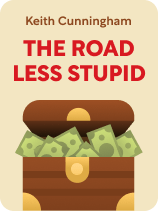

This article is an excerpt from the Shortform book guide to "The Road Less Stupid" by Keith Cunningham. Shortform has the world's best summaries and analyses of books you should be reading.
Like this article? Sign up for a free trial here.
Do you let pride cloud your judgment when it comes to running your business? Do you have goals but no plan for how to reach them?
In The Road Less Stupid, Keith Cunningham says that to achieve financial success, you must avoid easy mistakes. He describes the top mistakes that you need to avoid and explains his methodology for thinking through business issues.
Read below for a brief overview of The Road Less Stupid.
The Road Less Stupid by Keith Cunningham
The secret to financial success is to avoid making stupid mistakes, according to Keith Cunningham. And the key to making fewer stupid mistakes is to think before you act. If that sounds easy, it’s easier said than done. In The Road Less Stupid book, Cunningham discusses lessons that he learned the hard way, as well as business insights on a variety of issues, ranging from corporate culture to customer relations to risk assessment.
Cunningham is an entrepreneur, author, and speaker who runs a business school called Keys to the Vault.
Stupid Mistakes That Smart Executives Make
It’s not practical to list every stupid mistake that can or has been made in business, but some mistakes and misconceptions are common enough that Cunningham takes the time to discuss them particularly. Note that, as used by Cunningham, the word “stupid” refers specifically to things that you do or accept even though you are smart enough to know better. This contrasts with the way others sometimes use the term “stupid” to refer to a lack of intelligence.
In this section, we’ll examine these key mistakes so you’ll be able to more easily spot and avoid them.
Letting Pride Cloud Your Judgment
According to Cunningham, letting your emotions influence your business decisions will almost always result in stupid mistakes, which, in turn, will result in financial losses. One of the most dangerous emotions of all is pride because it can cause you to ignore risks or expect unrealistically easy profits.
He warns that having too much pride in your past successes can inflate your ego and give you unfounded confidence in the future success of your projects. In recounting his own greatest financial losses, Cunningham observes that one of the few good things about failing badly is that it humbles you. One humbling failure can help you view future projects more objectively because it takes humility to learn new things and assess your own ideas honestly, both of which are important for anyone directing a business.
But even if you’ve been humbled by failure, he says it’s helpful to have someone else who can review your proposals without getting emotionally involved. This second check helps keep your pride in check and prevents a lot of stupid mistakes. Many businesses have a board of directors for this purpose.
Building What You Want Instead of What Your Customers Want
Cunningham also argues that doing what you love and expecting to somehow make money on it is fundamentally a stupid idea. If you want to make money, you need to find out what your customers love (and are willing and able to pay for) and deliver it efficiently enough to make a profit.
For that matter, if you want to make more money or grow your business, Cunningham says you’re usually better off researching why people who know about your product aren’t buying it and addressing their concerns, rather than expanding your advertising to reach more people. If your product is making a bad impression, it’s stupid to expand your advertising, because then it will just make a bad impression on more people.
However, if there’s a grain of truth in the philosophy of doing what you love, it’s that you have to start with an understanding of your own resources and capabilities (which probably align with your interests) so you can make plans that you can realistically execute as you consider ways to win new or repeat customers. As Cunningham explains, starting with a realistic understanding of what you can do now helps you avoid another common business misconception: the idea that you should first identify your goals or desired end-state, and then plan how to achieve them. This philosophy implicitly assumes that you have the resources to execute any long-term vision that you can plan. And since you don’t have infinite resources, that’s a stupid assumption.
Confusing Goals With Plans
According to Cunnigham, another stupid mistake that frequently tempts executives is to establish a goal or vision for improving the company but fail to establish a detailed plan for achieving it. Just thinking about a desired end state doesn’t help you get there, no matter how much you want to. To reach it, you need to identify what obstacles stand between you and your goal (you’d already be there if nothing was holding you back) and figure out exactly what you need to do to overcome those obstacles.
Cunningham further explains that, while a detailed plan enables you to progress toward your goals, letting your plans become sacred is another stupid mistake. The value of a detailed plan is that it’s actionable (unlike a goal), and it gives you a standard against which to track your progress so you’ll know when you begin to deviate from it, as you inevitably will at some point. Deviations aren’t always a bad thing—sometimes you may discover opportunities along the way that are better than your original goal. But it’s important to know when you start to deviate so you can reassess the situation and update your plans as needed.
Misunderstanding Corporate Culture
One stupid mistake that, according to Cunningham, can have a devastating effect on productivity is misunderstanding the concept of corporate culture. Specifically, thinking that you can create a culture of high performance by creating a few unique job perks is stupid.

———End of Preview———
Like what you just read? Read the rest of the world's best book summary and analysis of Keith Cunningham's "The Road Less Stupid" at Shortform.
Here's what you'll find in our full The Road Less Stupid summary:
- That the secret to financial success is to avoid making stupid mistakes
- The most common stupid mistakes executives make and how to avoid them
- Why doing what you love does not always translate to making money






